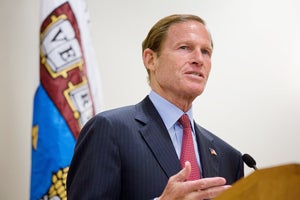Just hours after news outlets reported additional revelations Thursday morning concerning the scope of information gathered by the National Security Agency, U.S. Sen. Richard Blumenthal (D-Conn.) delivered an address at Harvard Law School on proposed legislation to reform the Foreign Intelligence Surveillance Court.
On August 8, the senior senator from Connecticut called the court established by the Foreign Intelligence Surveillance Act a “black box” that had remained secret both to the public at large and even to most members of Congress. Blumenthal said that although he serves on the Senate’s Committee on Armed Services, the revelation on Thursday that the NSA was searching the content of Americans’ e-mails and texts sent to or received from foreign countries was news to him as well.
Blumenthal stressed his deep respect for the intelligence agencies and institutions whose work has saved American lives. But, he warned, “trust and credibility depends on the appearance of fairness and accountability, and my fear is that some of those agencies and institutions are in peril of losing it.”
The senator proposed two pieces of legislation, co-sponsored by Senators Ron Wyden (D-Ore.) and Tom Udall (D-N.M.) aimed at addressing the court’s procedural issues.
FISA proceedings do not involve a traditional adversarial process, and instead the FISA court hears only the government’s interpretation of the law and the Constitution. The FISA Court Reform Act would create a special advocate whose role would be “to defend the Constitution” during FISA court proceedings and who could request that the court’s rulings or opinions, which are currently classified, be made public.
Another procedural reform would involve the selection of judges to the FISA court, all of whom are currently chosen by the chief justice of the United States. Many observers have noted that of the eleven judges that Chief Justice John G. Roberts Jr. ’79 has selected for the court, ten were judges originally appointed by Republican presidents. The FISA Judge Selection Reform Act would authorize the chief judge of every appellate circuit court to designate a judge to serve on the FISA court, whom the chief justice could then appoint or reject.
“Whatever our views on the extent of surveillance or even the degree of secrecy that surrounds surveillance programs, we’d be a lot more comfortable with the extensive surveillance program if we could trust that there is a fair arbiter after a fair process,” Blumenthal said. “We know as lawyers that process is important, and changes in this process are vitally needed.”
During a question and answer session after Blumenthal’s speech, HLS Professor Charles Fried questioned the senator’s premise that Americans should be alarmed over their privacy and liberty rights, noting that he held no such fear, and that individual abuses could be dealt with on a case-by-case basis. Blumenthal conceded that polls show that Americans fear threats to security more than they fear the threat of surveillance and abuse.
“You may not fear the consequences of an arbitrary and capricious process because you haven’t seen it applied to you,” he said.
Earlier in his talk, Senator Richard Blumenthal had noted Harvard Law School’s tradition of valuing the right to privacy, citing an 1890 Harvard Law Review article by HLS alumni Samuel Warren and Supreme Court Justice Louis Brandeis that traced the legal underpinnings of that right. In his last words to the audience, Blumenthal returned to Fried’s question: “The reason I’m here at Harvard Law School is that you have a tradition, in academia, and among lawyers of your caliber, to look ahead, look around the corners, see the potential for abuse and try to do something about it.”
The talk was presented in cooperation with the HLS Program on the Legal Profession, the Human Rights Program at HLS, the Berkman Center for Internet and Society at Harvard University, HLS International Legal Studies, the Institute for Global Law and Policy (IGLP) at HLS, and the Harvard University Institute of Politics.
